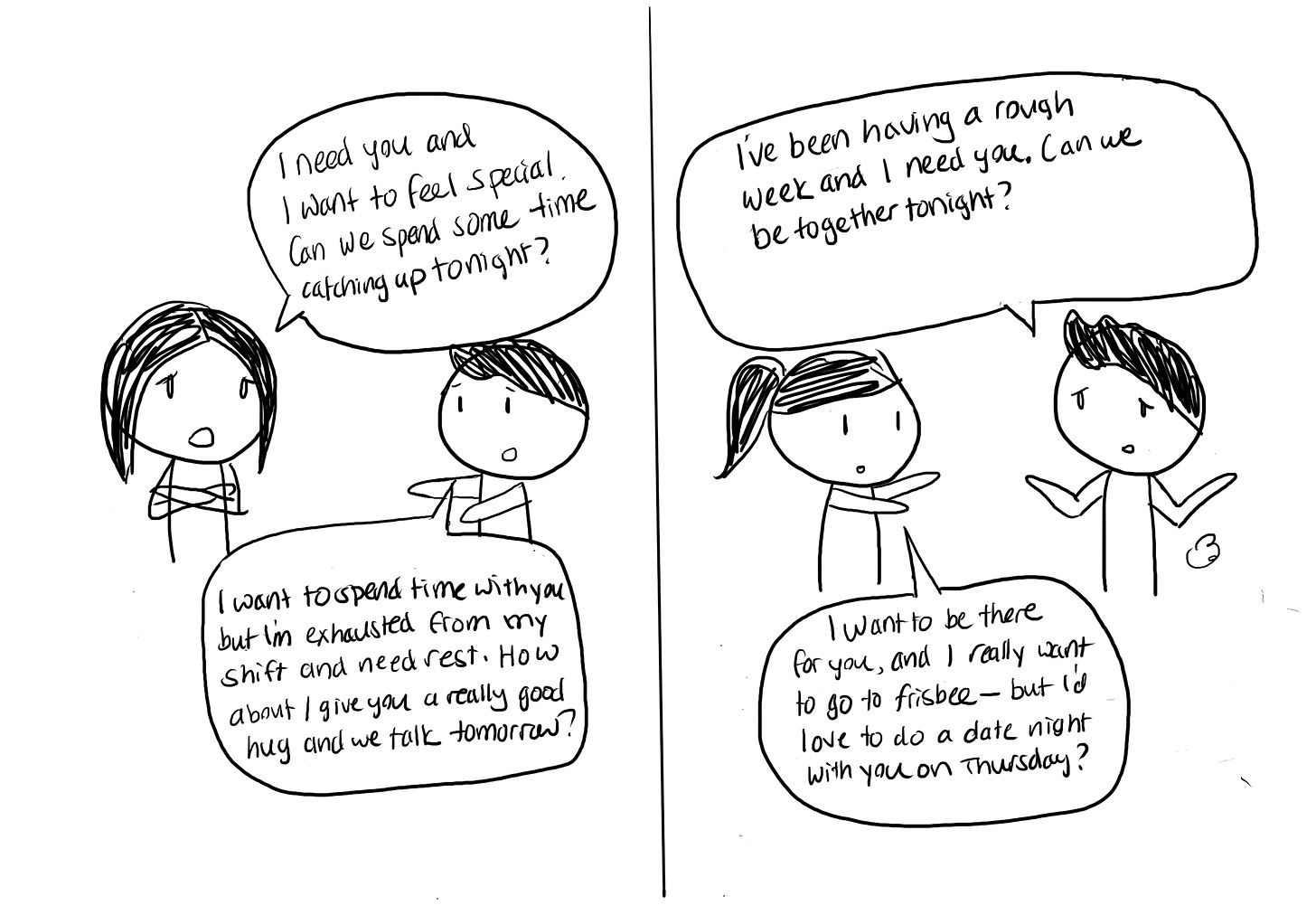The disney fairytale doesn’t work
What I learned from couples therapy and how it has redefined my relationship
This month, my partner and I finally made our honeymoon plans from 3 years ago happen. It was funny to do such a milestone this many years later because where our relationship is now is just so so different from where it was then.
Getting married felt like a dream. There we were, surrounded by the people we loved, publicly declaring that we had indeed found our other half, our partner for life. This was our happy ending, and we would do everything in our power to make it last.
Things get hard
But in our first year of marriage, we came across arguments that we couldn’t resolve.
I couldn’t believe it. We had overcome so much — now that we were married, why did our conflicts threaten to tear us apart?
That’s when we started going to couples therapy (which… wasn’t an easy decision at first).
There was no easy answer to our conflict. Instead, we’ve been doing the hard work of relearning what being a married couple looks like.
We went into couples therapy with a lot of preconceived notions about what a good relationship is and what a good marriage has to be like. I’d like to share with you some of the biggest myths we came in with, why they got in our way, and how we think about things now.
Myth #1: The best way to meet your partner’s needs is by doing what they ask
In the beginning of out relationship, it was easy — we’d do whatever we could to make the other person feel special.
But as time passed, that level of dedication faded. And for good reason: there was much more to attend to in life than just our relationship — we couldn’t always put the other’s needs first.
Despite understanding that, we still had needs we wanted met. So we’d end up in situations like this:
→ Why it didn’t work: Things became a game of blame and shame. Out of guilt, we both tried to make changes. I started constantly checking Justin’s calendar, trying to be home when he was. He did his best to be curious, no matter how little sleep he got. But the changes took a toll. We grew increasingly resentful because the amount we sacrificed for the other was never enough. We’d still hear that we didn’t care. Our wants and our partner’s needs just felt totally incompatible, which made us wonder — were we still compatible?
→ The truth: That’s when our therapist stepped in. Yes, he said, you have responsibilities to your relationship, but you are also each your own individual. And when it came to addressing the needs on the table, we each had a choice in what we decided to do and how we did it.
But to make an informed decision, we each had to get better at communicating our actual asks. Because the curiosity and time we were asking for, these were just the asks on the surface. The actual wants were much deeper.
What we were actually asking for was to feel loved, wanted, needed.
Once we knew that, it became a lot easier to care for our own needs while still being able to meet the other’s.
→ TL;DR: The best way to meet your partner’s needs is to listen for the deeper need at hand. There is more flexibility in how you meet that (while still being able to respect your own needs!) than you think.
Myth #2: As a couple, you should never go to bed angry
As someone who grew up in a very conflict averse family, I always tried to resolve arguments right away. It didn't matter how late it was or how tired I felt, I would do what needed to be done to prevent any lasting harm. And so I continued this tradition in my own relationship.
But there came a day where it stopped working.
→ Why it didn’t work: One day, we had a fight that got too big. Nothing could get us to see eye to eye. But I just couldn’t bear going to bed angry — doing so felt like admitting that there was something irreparable in our relationship. So I kept pushing forward, fighting tears and frustration.
The thing was, with stakes that high, the conversation was bound to fail.
Minutes turned to hours. My partner could barely keep his eyes open — maybe he didn’t care enough?
Meanwhile, my partner was getting more and more stressed as the start of his work day loomed every closer — why was fixing his relationship directly at odds with him getting enough sleep to survive his 12 hour hospital shift?
We ended that night exhausted, emotionally spent, and with no great resolution — only a wild fear for the future of our relationship.
→ The truth: The truth is, not all conflicts can or should be solved in a day! When you’re tired, riled up, or otherwise not your best self, it’s actually the worst time to continue to push forward.
The best thing we could do was to give it time.
Step away. Sleep in different rooms. Go to work. Visit a friend. Do anything else, and just let. the. conflict. exist.
Easier said than done. I had such a hard time letting discomfort just exist. It was completely counterintuitive to how I had been taught to handle problems. I wanted to do something about it. I didn’t want to just leave it up to time.
But…it actually worked. By taking time, our emotions got air to breathe. Our thoughts got space to settle. We could sleep, eat, and do whatever we needed to get back to a better mind space. And when we returned, we were less defensive, more grounded, and way more capable of listening.
TL;DR: It’s normal for conflicts to take time to resolve. As uncomfortable as it is, give it the time it needs so that you can both be in a better place to hear each other and work through it.
Myth #3: Marriage means that your relationship is set for life. Divorce means that your relationship has failed.
When my partner and I got married, it meant that we were committing to each other for life. Divorce was out of the question.
But last year, we ran into a challenge that made us question the very foundation of our relationship. For the first time, our desires were completely at odds, and we didn’t know what to do.
→ Why it didn’t work: Staying together was so critical that I didn’t listen to what I actually needed. I told myself my needs were flexible. I could mold myself to the situation, be open, explore. But the compromises didn’t last. Each time, I’d start out and be super supportive, only to lash out in anger and bitterness a few days later.
I couldn’t be okay with my partner’s wants, but I also couldn’t leave. The idea of divorce, with all of its social stigma, was too devastating. I was stuck in this incomprehensible mess, and, I had decided, I was utterly powerless in it.
→ The truth: The truth was, I did still have power.
I could decide whether I wanted to leave.
Our therapist had us consider this option for real.
Once we got past our initial protests (“divorce? no no no we don’t want that we can’t”), we started outlining what it would look like. Who would get the house? The cats? How would we split our finances? Would he move? Would I? And how would we tell our friends and family?
The conversation was gut wrenching. But getting into the details also made divorce less scary, less world ending.
Our stories would continue on. And at some point, we would be okay.
Through that process, we saw that divorce was a real choice. We each had the agency to choose to opt out. Which meant that there was no reason to accept a decision we couldn’t live with.
With divorce on the table, we were finally able to progress in our conversation. Separating would be not so much a failure, but an acknowledgment of our different needs. It would mean that we had finished growing together and now wanted to grow in different directions.
It was with everything out in the open that we realized we both still very much wanted to be in this relationship. We had so much we still wanted to learn together. So we would design a way to move forward. We would continue to choose each other.
→ TL;DR: You, your partner, and your relationship will ALL keep changing. Relationship security comes from you and your partner continuing to choose each other.
Conclusion
When we got married, we unconsciously brought in so many standards that we thought had to be met. We saw marriage as a security blanket. By signing a contract and saying our vows, we believed that finally, we were safe.
But that sort of trust and security isn’t real. It comes from a contract that ties you to your word. It doesn’t take into account how, as time passes, our feelings and needs and desires to be in this relationship inevitably evolve and change.
Marriage isn’t what makes a relationship last. Choice is.
Truthfully, we don’t know if we’ll be together forever. True stability doesn’t exist. But right now, we’re choosing each other because we want to continue to change and evolve together. We will continue to communicate clearly, be honest, and build trust with each other. And that’s the most stability we can ask for.
All relationships end.
That could be via a breakup, divorce. Even a lifelong marriage ends — in death. The end of a relationship is normal.
And even if it ends, it can still have been worth it.
For early reflections on our experience with couples therapy, check out this post:















